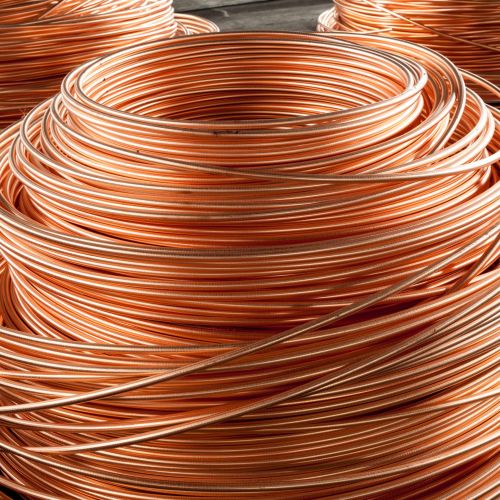Copper Wires
Copper wires are electrical conductors made from refined copper, widely used in electrical and electronic systems due to their excellent conductivity, ductility, and thermal properties. They are produced in various gauges, types, and insulation levels to suit different applications.

Key Properties
- High Electrical Conductivity: Copper is second only to silver in conductivity, making it ideal for efficient power transmission.
- Ductility: Can be easily drawn into thin wires without breaking.
- Thermal Conductivity: Excellent at dissipating heat, essential for electrical safety.
- Corrosion Resistance: Resists oxidation and degradation, especially in dry environments.
- Strength: Durable and able to withstand mechanical stresses.
- Recyclability: 100% recyclable without loss of quality.
Wire Types
- Bare Copper Wire
- Uninsulated, highly conductive.
- Used in grounding, electrical connections, and busbars.
- Tinned Copper Wire
- Coated with tin to enhance corrosion resistance.
- Common in marine and humid environments.
- Stranded Copper Wire
- Made of multiple small wires twisted together.
- More flexible and durable than single-core wires.
- Solid Copper Wire
- A single, solid strand of copper.
- Preferred for permanent installations and high-current applications.
- Insulated Copper Wire
- Coated with plastic or rubber insulation.
- Used in residential, industrial, and automotive wiring.
Applications
- Electrical and Power Transmission
- Power Cables: For homes, industries, and power grids.
- Overhead Transmission Lines: Especially in bare or tinned forms.
- Electronics
- Circuit Boards: Essential for connecting components.
- Coils and Transformers: For electromagnetic applications.
- Automotive and Transportation
- Wiring in cars, airplanes, and trains for lighting, batteries, and electronics.
- Telecommunication
- Used in Ethernet cables, coaxial cables, and fiber optic grounding.
- Industrial Equipment
- Motors and Generators: Copper windings enhance efficiency.
- Control Panels: For high-power applications.
Advantages
- High Efficiency: Reduces energy losses during transmission.
- Reliability: Long lifespan due to corrosion resistance and durability.
- Versatility: Suitable for a wide range of applications.
- Safety: Copper’s thermal properties reduce overheating risks.
